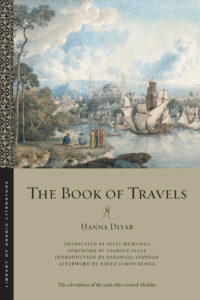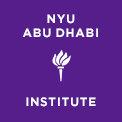 In this post, Reem Adnan Khayyal introduces us to the #BookTwitter community and describes her experience leading an online group read of Hanna Diyab’s The Book of Travels.
In this post, Reem Adnan Khayyal introduces us to the #BookTwitter community and describes her experience leading an online group read of Hanna Diyab’s The Book of Travels.
On December 1st, we started #Diyab22, in which readers from all around the world were invited to read Hanna Diyab’s The Book of Travels as our #booktwitter read for the month of December, with readers sharing their favorite quotes, thoughts, comments, questions and trivia using the hashtag #Diyab22.
Taking part in online group reads, we have learned to read differently. In an attempt to alternate between the Western canon and Eastern corpus of literature, the translations of the Library of Arabic Literature have played an integral part. If East and West are to complement each other, the East is best experienced by reading the LAL blue books, which make Arabic literature available to the English-language audience.
Each month, we read one, sometimes two books, while sharing quotes and trivia and generally bonding over the books we read together. Very often, it is a transformative reading experience.
Along with a group of great readers, we often have access to authors or their translators. For The Book of Travels, we had easy access to translator, critic, and scholar, Dr. Elias Muhanna of Brown University, who upon hearing about our read immediately joined the group read. We will always be grateful for this friendly gesture. A translator is above all a reader. No read of Arabic literature would be complete without mention of Marcia Lynx Qualey of @Arablit, who always brings Arabic literature to our immediate attention as she encourages us to read widely.

“Books” by ninocare. CC0 via Pixabay.
For us, group reading is an act of shared solitude; it is also a conversation. Reading together has encouraged us to pursue great books. As a group, we’ve been meeting in the same virtual space on Twitter with readers signing up for group reads to read all those books that have been on our TBR (To Be Read) list for some time and often require the company of dedicated readers to make it through, say a doorstopper of a book like Musil’s The Man Without Qualities, Gaddis’s The Recognitions, Tokarczuk’s The Books of Jacob, Undset’s Kristen Lavransdatter, Young’s Miss Macintosh My Darling, Mahfouz’s The Cairo Trilogy, Gass’s The Tunnel, Broch’s The Death of Virgil and Joyce’s Finnegans Wake which we’re reading a-page-a-day, to name a few. The list goes on and on. We read and revisit the classics. We push through when we would otherwise stumble and put a bookmark in the book and call it quits. As lit lovers, we covet the experience of a shared read. We pre-order our books and wait patiently for an English translation to come out. Never intimidating, the point is to simply read the book, sharing quotes, favorite passages, engaging with the text, and learning more about the author.
Having readers that are multicultural and multilingual, we will have readers reading in the original, others in different languages or different translations. Some read in print, others electronically. Having different reactions and noticing sentences that speak to us enriches the reading experience. We like to think of our motto as being, “If they say it’s difficult, we’ll read it. When we read it, it’s no longer difficult.”
As a multilingual reading community, we at #booktwitter especially like to highlight the work of the translator, and as readers are very particular when choosing which translation we wish to read. We understand and appreciate the challenge of a good translation. Reading the bilingual edition, we agreed that Muhanna has given us a highly readable translation. As readers, we appreciate that LAL consistently places the translator’s name on its covers.
“Translators are the shadow heroes of literature, the often forgotten instruments that make it possible for different cultures to talk to one another, who have enabled us to understand that we all, from every part of the world, live in one world.” – Paul Auster
 Drawing comparisons to his siyahah or wanderings, writing from a Syrian point of view, in an archaic accent, “a hybrid of his Levantine vernacular and the standard Arabic of his time”, Diyab writes travel literature as a genre that often has a combination of fact and fiction with stories that have literary merit to them. These stories serve as records of discovering new worlds and experiencing different cultures. When Diyab’s The Book of Travels was discovered in the archives of the Vatican Library, this miraculous preservation of a manuscript revealed the details of Diyab’s journey to Paris and his meeting with Antoine Galland, giving us the knowledge that solved the mystery of who authored the “orphan tales” of the Thousand and One Nights.
Drawing comparisons to his siyahah or wanderings, writing from a Syrian point of view, in an archaic accent, “a hybrid of his Levantine vernacular and the standard Arabic of his time”, Diyab writes travel literature as a genre that often has a combination of fact and fiction with stories that have literary merit to them. These stories serve as records of discovering new worlds and experiencing different cultures. When Diyab’s The Book of Travels was discovered in the archives of the Vatican Library, this miraculous preservation of a manuscript revealed the details of Diyab’s journey to Paris and his meeting with Antoine Galland, giving us the knowledge that solved the mystery of who authored the “orphan tales” of the Thousand and One Nights.
This manuscript showed us how the power of storytelling dominated Diyab’s ruminations on a journey that gave us stories which had us entranced. It was also the continuation of the Arab tradition of travel literature. There’s a saying, widely attributed to Ibn Battutah, that goes, “Traveling—it leaves you speechless, then turns you into a storyteller.”
As the storyteller of several significant stories, most notably Aladdin, Ali Baba and the Forty Thieves, Prince Ahmad and the Fairy Peri-Banu, Abu al-Hassan, the Sleeper and the Waker, the Night Adventure of Caliph Harun al-Rashid, and The Two Sisters Who Envied Their Younger Sister, Diyab became the “obscure consultant” who gave Galland several more tales that were not part of the original translation of the Thousand and One Nights.
The stories of this “obscure consultant” would go on to have an immeasurable effect on popular culture and literature. Jorge Luis Borges in his Selected Non-Fictions writes, “Word for word, Galland’s version [of the Thousand and One Nights] is the worst written, the most fraudulent and the weakest, but it was the most widely read. Readers who grew intimate with it experienced happiness and amazement. Its orientalism, which we now find tame, dazzled the sort of person who inhaled snuff and plotted tragedies in five acts. Twelve exquisite volumes appeared from 1707 to 1717, twelve volumes innumerably read, which passed into many languages, including Hindi and Arabic.”
 One remembers Marcel Proust writing of meals taken with Tante Leónie in his novel, In Search of Lost Time: “We would be found seated in front of our Arabian Nights plates, weighed down by the heat of the day, and even more our heavy meal,” this in the dining room where Proust would sit and read. “At least, you will not forget to give me my creamed eggs on one of the flat plates? These were the only plates which had pictures of them and my aunt used to amuse herself at every meal by reading the description on whichever might have been sent up to her. She would put on her spectacles and spell out: ‘Ali Baba and the Forty Thieves,’ ‘Aladdin, or the Wonderful Lamp,’ and smile, and say ‘Very good indeed.’”
One remembers Marcel Proust writing of meals taken with Tante Leónie in his novel, In Search of Lost Time: “We would be found seated in front of our Arabian Nights plates, weighed down by the heat of the day, and even more our heavy meal,” this in the dining room where Proust would sit and read. “At least, you will not forget to give me my creamed eggs on one of the flat plates? These were the only plates which had pictures of them and my aunt used to amuse herself at every meal by reading the description on whichever might have been sent up to her. She would put on her spectacles and spell out: ‘Ali Baba and the Forty Thieves,’ ‘Aladdin, or the Wonderful Lamp,’ and smile, and say ‘Very good indeed.’”
Very good indeed.
Do check out #Diyab22 #TheBookOfTravels and be in the jovial company of Hanna Diyab, the muse, the informant. Understand the difference between blue turbans and white. See the mask of the European envoy. Learn about the European traveling doctor. Practice medieval segmented sleep. Figure out nautical miles and waterwheels. Discover Frankish lands as seen through Arab eyes. Realize that with famine comes generosity. Find out what Diyab has to say about Parisian toilets and much more.
We continue our journey with #ArabianNights23.
—
Reem Adnan Khayyal is a reader and literary enthusiast. She organizes group reads on #BookTwitter. Reem’s Twitter handle is Paper Pills ريم @ReemK10. She recently started the group #BookTwitter- A Literary Salon on Goodreads. Reem’s seven-word bio, a haiku of sorts, or if you’re very modern a tweet: Euphorically constructs, ecstatically curates, her own world.

